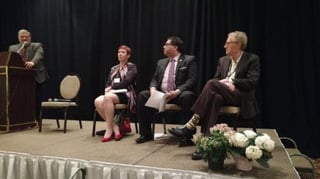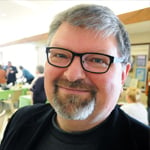This article originally appeared in the Canadian Mennonite Journal on June 6, 2016, by Paul Born
I was a young child when my family and I came to Canada as Mennonite refugees from the Ukraine. We were displaced people seeking to create a new life for ourselves.
My personal experience of poverty has shaped my life’s work. It’s why I founded Tamarack, a non-profit organization that helps people collaborate to tackle the toughest social problems, including poverty. It’s why my long-held, deep hope is to end poverty in Canada.
That sounds audacious. But this is a unique moment in our country.
For the first time, every provincial and territorial government has, or is considering, a poverty reduction strategy. Cities are also stepping up to the challenge with enthusiasm and commitment.
I was thrilled to feel the passion and energy at an event Tamarack hosted in April in Edmonton. We called it “Cities Reducing Poverty: When Mayors lead,” and we gathered 350 people, including mayors from 20 cities across Canada. We heard about bold action at the municipal level:

Paul Born moderates a panel discussion with Edmonton businesswoman Ruth Kelly, Calgary Mayor Naheed Nenshi, and Senator Art Eggleton at the Cities Reducing Poverty: When Mayors Lead conference.
- New Westminster, BC, was the first municipality in Canada to introduce a local living wage that gives dignity to the “working poor.” Other cities have followed.
- Medicine Hat, AB., is the first city in Canada to eliminate homelessness, and now benefits from the lower cost of housing people versus providing emergency social services and healthcare for people living on the street.
- Edmonton and Toronto have prepared ambitious anti-poverty strategies that emphasize reducing racism and discrimination, two big barriers that block people from rising out of poverty.
- Calgary has introduced a program allowing low-income residents to buy a monthly transit pass for $44, less than half the $99 cost of a standard monthly pass. This lets people access jobs and services so they can create a better life.
- Winnipeg, which has the country’s largest urban indigenous population, has set a goal to improve outcomes for young children in an especially vulnerable community in the North End.
- Hamilton, ON, is educating people about the risks of payday loans by requiring lenders to post borrowing costs and to provide credit counselling.
These are exciting, concrete, “do-able” steps. Collectively, they make a big difference for our most vulnerable citizens. This can only happen when a cross-section of citizens – business, government, social services, faith communities, and people who have personal experience of poverty — come together to tackle a challenge.
As the anti-poverty movement grows, people begin to see poverty differently. There is an emerging understanding that our communities are most vibrant when every member has the chance to participate. Reducing poverty is good for all of us. It helps our communities reach their potential, because “my neighbour’s strength is my strength.”
As our mindset shifts, we begin to appreciate that poverty is a human-rights issue, a question of basic justice for every person. We have a sense that poverty isn’t inevitable, it’s created. And if humans created it, we can eliminate it too.
Tamarack’s goal is to increase the number of cities with poverty reduction strategies from about 55 right now, to 100, and to help cities share ideas and best practices. We know that when cities work together, they engage the entire population in poverty reduction. And we know that broad community engagement is the only way we can make a lasting difference for our 4.8 million fellow Canadians who struggle to pay rent, buy groceries, and invest in their children’s futures.
Our vision is that by 2020, we and our partners will impact the lives of a million Canadians living in poverty and we will reduce by 10 percent the number of people living in poverty in our country.
Take a moment to imagine a poverty-free Canada. What would it look like?
At our Edmonton event, participants created newspaper cover pages to express this vision. They wrote headlines that talk about living wages for every worker and education for every child. They describe a growing trust between indigenous and non-indigenous Canadians, and a Charter of Rights guarantee of housing and food security. They envisioned a coalition of citizens, business and government pursuing shared targets for social well-being. They saw food banks closing and people thriving.
Our collective commitment to end poverty in Canada is gaining ground. Yes, this task may seem unlikely, even impossible on some days. But as Nelson Mandela reminds us, “It always seems impossible, until it’s done.”
Paul Born is president and coach at Tamarack Institute for Community Engagement, Waterloo, Ont. To learn more, visit paulborn.ca, and follow @paulborn, @VC_Canada and @LivingWageCDA.





